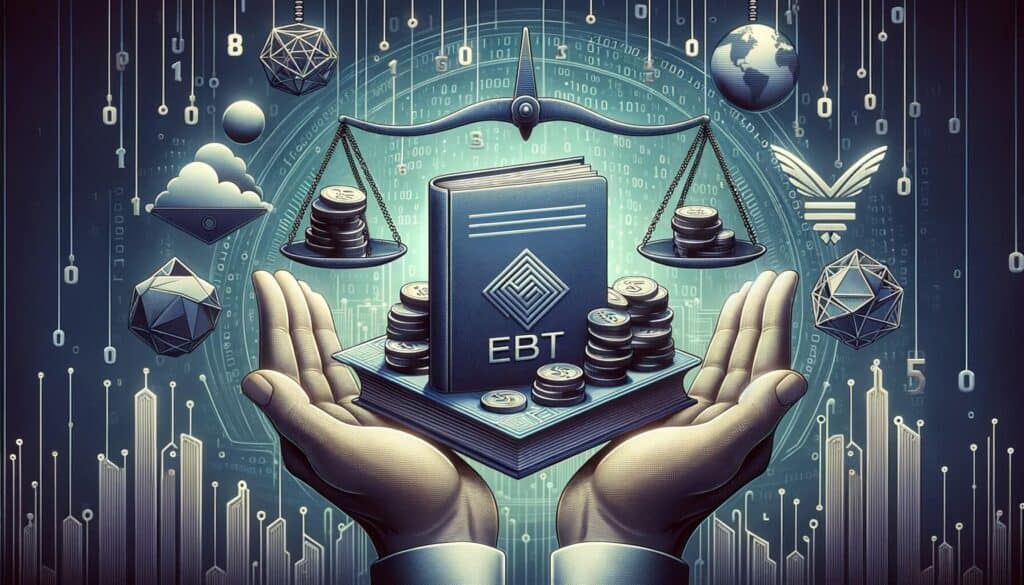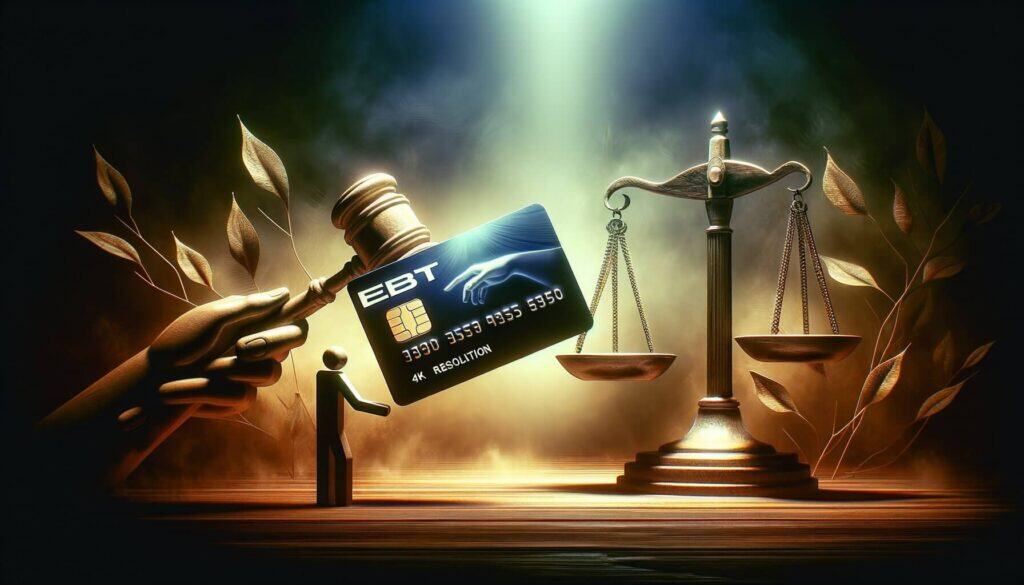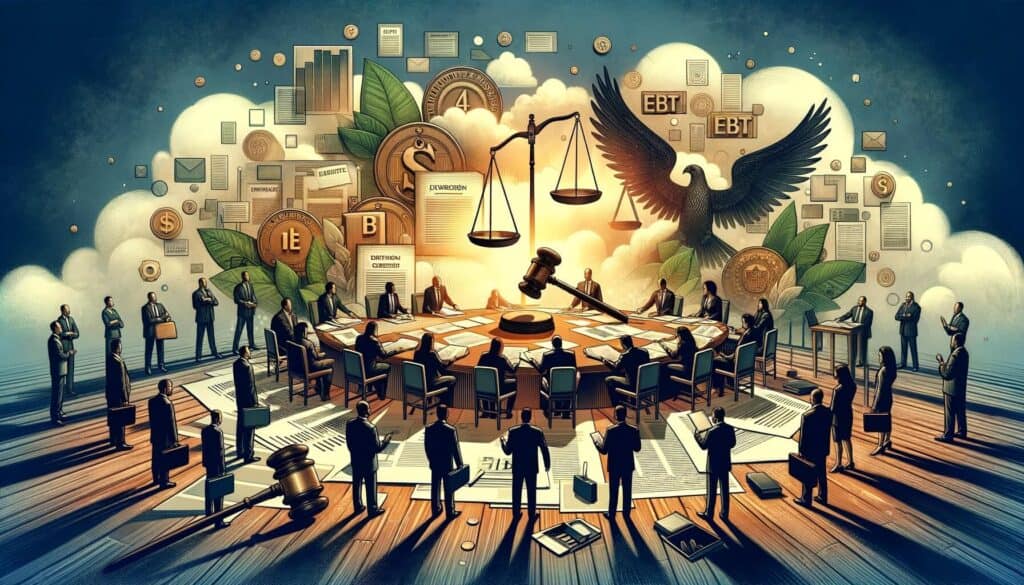
By Sharon Watson April 9, 2025
The Electronic Benefit Transfer (EBT) program is a government assistance program that provides eligible individuals and families with funds to purchase food and other essential items. The program is administered by the United States Department of Agriculture (USDA) and is aimed at helping low-income individuals meet their basic needs. However, like any government program, the EBT program has regulations in place to ensure its proper functioning and prevent abuse.
In this article, we will explore the legal implications of violating EBT program regulations. We will discuss the importance of complying with these regulations, the types of violations and their legal consequences, fraudulent activities and penalties, investigating and prosecuting EBT program violations, defending against EBT program violation charges, civil consequences of EBT program violations, and address frequently asked questions about EBT program violations.
The Importance of Complying with EBT Program Regulations

Complying with EBT program regulations is crucial for several reasons. Firstly, it ensures that the program is used as intended, providing assistance to those who genuinely need it. By following the rules, eligible individuals can access the benefits they are entitled to, while preventing those who do not qualify from taking advantage of the program.
Secondly, compliance with EBT program regulations helps maintain the integrity of the program. The EBT program relies on taxpayer funds, and any misuse or abuse of these funds undermines public trust in the program. By adhering to the regulations, individuals and families can help preserve the program’s reputation and ensure its sustainability for those who truly need it.
Types of Violations and Their Legal Consequences

Violations of EBT program regulations can take various forms, each with its own legal consequences. Some common violations include:
1. Unauthorized use of EBT benefits: Using EBT benefits to purchase prohibited items or selling them for cash is a violation of program regulations. This includes using EBT benefits to buy alcohol, tobacco products, or non-food items. The legal consequences for unauthorized use can range from warnings and disqualification from the program to criminal charges and fines.
2. Fraudulent reporting of income or household size: Providing false information about income or household size to qualify for EBT benefits is considered fraud. This type of violation can result in criminal charges, fines, and disqualification from the program. The severity of the consequences depends on the extent of the fraud and the intent behind it.
3. Trafficking of EBT benefits: Trafficking refers to the illegal exchange of EBT benefits for cash or non-food items. This can involve selling EBT cards or PIN numbers, or using them to purchase items for resale. Trafficking is a serious offense and can lead to criminal charges, substantial fines, and permanent disqualification from the program.
4. Failure to report changes in circumstances: EBT recipients are required to report any changes in income, household size, or other relevant information to the program administrators. Failure to do so can result in penalties, including disqualification from the program and the need to repay any benefits received improperly.
Fraudulent Activities and Penalties in the EBT Program

Fraudulent activities in the EBT program can have severe legal consequences. The penalties for EBT program fraud vary depending on the jurisdiction and the specific circumstances of the case. However, they generally include criminal charges, fines, and disqualification from the program.
In cases of EBT fraud, law enforcement agencies work closely with program administrators to investigate and prosecute offenders. This collaboration ensures that fraudulent activities are detected and dealt with effectively. Investigators may use various methods, such as data analysis, surveillance, and undercover operations, to gather evidence against individuals suspected of EBT fraud.
Once evidence is gathered, prosecutors will determine the appropriate charges based on the severity of the offense. These charges can range from misdemeanors to felonies, depending on the amount of money involved and the intent behind the fraud. The penalties can include imprisonment, fines, restitution, and probation.
Investigating and Prosecuting EBT Program Violations

Investigating and prosecuting EBT program violations requires collaboration between multiple agencies and departments. The USDA’s Office of Inspector General (OIG) is responsible for investigating allegations of fraud and abuse in the EBT program. They work closely with state and local law enforcement agencies, as well as program administrators, to gather evidence and build cases against offenders.
During an investigation, the OIG may conduct interviews, review financial records, analyze transaction data, and collaborate with other agencies to gather evidence. They may also use advanced technology and data analysis tools to identify patterns of fraud and detect suspicious activities.
Once the investigation is complete, the OIG will present the evidence to the appropriate prosecuting authority, such as the local district attorney’s office or the U.S. Attorney’s Office. Prosecutors will then review the evidence and determine whether to file charges against the individuals involved in the EBT program violations.
Defending Against EBT Program Violation Charges
If you are facing charges for violating EBT program regulations, it is essential to mount a strong defense. The specific defense strategies will depend on the circumstances of your case, but some common approaches include:
1. Lack of intent: If you can demonstrate that you did not knowingly or intentionally violate EBT program regulations, it may be possible to argue that you should not be held responsible for the alleged violation. This defense strategy is particularly relevant in cases where the violation was a result of a misunderstanding or a mistake.
2. Insufficient evidence: Challenging the evidence against you is another defense strategy. This can involve questioning the reliability or admissibility of the evidence presented by the prosecution. For example, if the evidence was obtained through an illegal search or seizure, it may be possible to have it excluded from the case.
3. Mistaken identity: If there is a possibility of mistaken identity, you can argue that you were not the person responsible for the alleged violation. This defense strategy requires presenting evidence that supports your claim and casts doubt on the prosecution’s case.
4. Procedural errors: If there were procedural errors or violations of your rights during the investigation or prosecution, you can challenge the legality of the process. This can include violations of your Miranda rights, improper handling of evidence, or failure to follow proper procedures.
Civil Consequences of EBT Program Violations
In addition to the legal consequences, EBT program violations can also have civil consequences. Program administrators have the authority to impose penalties and sanctions on individuals who violate program regulations. These penalties can include disqualification from the program, the need to repay improperly received benefits, and the loss of future eligibility for assistance.
Disqualification from the EBT program can have significant implications for individuals and families who rely on the benefits for their basic needs. It can result in a loss of financial support and make it challenging to meet essential expenses such as food and housing. Additionally, individuals who are disqualified from the program may face social stigma and difficulties in accessing other forms of assistance.
Frequently Asked Questions (FAQs) about EBT Program Violations
Q1. Can I go to jail for violating EBT program regulations?
Answer: Yes, depending on the severity of the violation and the specific circumstances of the case, individuals who violate EBT program regulations can face criminal charges and potential imprisonment.
Q2. What should I do if I am accused of EBT program fraud?
Answer: If you are accused of EBT program fraud, it is crucial to seek legal representation immediately. An experienced attorney can guide you through the legal process, protect your rights, and help you build a strong defense.
Q3. Can I appeal a decision to disqualify me from the EBT program?
Answer: Yes, if you are disqualified from the EBT program, you have the right to appeal the decision. The appeals process may vary depending on the state, but generally, you will need to submit a written appeal and provide supporting documentation.
Q4. Can I be charged with EBT program fraud if I made an honest mistake?
Answer: If the violation was a result of an honest mistake and there was no intent to defraud the program, it may be possible to argue that you should not be charged with EBT program fraud. However, it is essential to consult with an attorney to assess the specific circumstances of your case.
Q5. Can I be charged with EBT program fraud if someone else used my EBT card without my knowledge?
Answer: If someone else used your EBT card without your knowledge or consent, it may be possible to argue that you should not be charged with EBT program fraud. However, you will need to provide evidence to support your claim and demonstrate that you were not involved in the fraudulent activity.
Conclusion
Violating EBT program regulations can have severe legal consequences, including criminal charges, fines, and disqualification from the program. It is essential to understand and comply with these regulations to ensure the proper functioning of the program and prevent abuse.
If you are facing charges for EBT program violations, it is crucial to seek legal representation to mount a strong defense and protect your rights. By adhering to the regulations and reporting any changes in circumstances, eligible individuals can access the benefits they need while preserving the integrity of the EBT program.